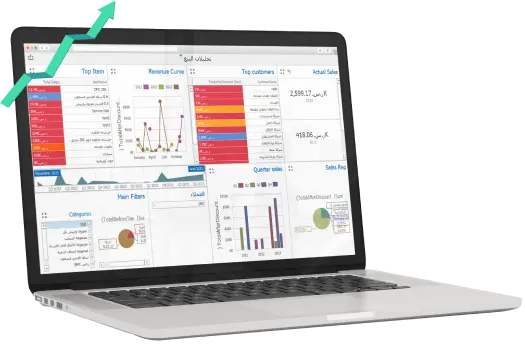Large companies and factories have agents or distributors who sell the goods in return for receiving a commission from the company when selling, and also the company incurs other expenses under the terms of the contract, but the ownership of the goods remains owned by the company and not by the agent or distributor until the agent sells it to another party
This process occurs in the practical reality in the food companies and the idea is that the factory or company wants to open a market in a region, but it does not have the possibility of doing market research in the region, as well as the availability of human and material capabilities of truck leasing, warehouses, etc., so the company is assisted by the agent in addition to the company incurs some expenses according to the contracting system with the agent this is other than that the distributors have high efficiency in distributing products
The consignment inventory is not considered purchases for the agent, but rather as a consignment inventory for sale.
Also, the goods do not generate revenue, because the revenue is only recognized through the sale of the goods by the agent
The consignment inventory, although it is in the consignee warehouse, is not included in the company's ending inventory when preparing the financial statements and it is not permissible to show it as an asset in the balance sheet
Commercial Agency Contract
The commercial agency contract defines the rights and liability of both the principal and the agent under the terms of the contract
There are often common terms such as
A- In the case that it is the nature of goods prices to be variable, then the agent is not exposed to any losses.
B- In the case that the goods have expired, the agent will not be responsible for damaged goods unless it proves that the damage occurred as a result of negligence.
C- The principal has the right to return the goods at any time he wants.
D- The contract between the principal and the agent determines who will incur the bad debts resulting from credit sales in the case that the agent sells goods on credit.
And any other terms according to the agreement between the principal (the company) and the agent.
Accounting Treatment for Consignment Inventory
On 15/3/2015, Al-Salam Company shipping goods costing 60,000 to the agent (Al-Etihad Trading Company) as a consignment inventory, Al-Salam Company paid LE2,000 for the cost of shipping Al-Etihad Trading Company and Al-Etihad Trading Company paid 2000 for leasing warehouse to be refunded from Al-Salam Company, in addition to LE3,000 for the amount of advertising, half of it, to be refunded, according to the terms of the contract, the agent pays 40,000 the recovered insurance until the contract expires on 20/7/2015, it was found that Al-Etihad Trading Shops sold 50% of the goods for 50,000, Al-Etihad Trading Company earned a 10% commission and provides the amount due to Al-Salam Company monthly.
1- Recording Journal Entry of being the amount of claim received in the Books of Consignor- Al-Salam Company
|
Account |
Debit |
Credit |
|
Cash |
40,000 |
|
|
Insurance Company (Name of the insurer) (Recovered insurance liability until the contract expires), Other credit balances |
40,000 |
Recording Payment of Insurance Premium in the Books of Consignee - Al-Etihad Trading Company
|
Account |
Debit |
Credit |
|
Consignment (Recovered insurance asset returned upon the contract termination (Other debit balances) |
40,000 |
|
|
Cash |
40,000 |
2- When goods are sent to the consignee (Al-Etihad Trading Company), from the warehouse of Al-Salam Company
Journal Entries in the Books of Consignor- Al-Salam Company
|
Account |
Debit |
Credit |
|
Consignment - Al-Salam Company |
60,000 |
|
|
Goods Sent on Consignment |
60,000 |
In the Books of Consignee/ Al-Etihad Trading Company
No need to make any Journal Entries in this case, but a Goods Received Note is prepared, as being goods on consignment
3- Expenses Incurred by Consignor- Al-Etihad Trading Company
Journal Entries in the Books of Consignor- Al-Salam Company
|
Account |
Debit |
Credit |
|
Consignment - Al-Etihad Trading Company- (freight value is added to the value of consignment inventory) |
2000 |
|
|
Cash |
2000 |
In the Books of Consignee (Al-Etihad Trading Company) - Not Applicable - as we explained that he only receives the goods because it is being on consignment
4- Expenses Incurred by Consignee
In the Books of Consignor (Al-Salam Company) No need to make any Journal Entries because being expenses incurred by the consignee (Al-Etihad Trading Company)
In the Books of Consignee - Al-Etihad Trading Company
|
Account |
Debit |
Credit |
|
Consigner- Al-Salam Company - (The consignor Al-Salam Company shall incur half of the advertising value according to the agreement) |
1500 |
|
|
Advertising Expense |
1500 |
|
|
Cash |
3000 |
5-Sale by Consignee - Al-Etihad Trading Company - Consignment Inventory: The sales value was 50,000
In the Books of Consignor - Al-Salam Company
No need to make any Journal Entries in this case
In the Books of Consignee - Al-Etihad Trading Company
|
Account |
Debit |
Credit |
|
Cash (for cash sale) |
50,000 |
|
|
Consignor (Al-Salam Company) |
50,000 |
6- At the end of the period or month, Al-Etihad Trading Company (the consignee) pays to Al-Salam Company, the value of sales after deducting the commission and expenses that were incurred
In the Books of Consignor - Al-Salam Company
|
Account |
Debit |
Credit |
|
Cash |
43500 |
|
|
Advertising Expense (previously incurred by the consignee 50% of the advertising value) |
1500 |
|
|
Commission- Al-Etihad Trading Company (50,000 * 10% commission) |
5000 |
|
|
Consignment Sales Revenue |
50,000 |
In the Books of Consignee- Al-Etihad Trading Company
|
Account |
Debit |
Credit |
|
Consignor (Al-Salam Company) |
50,000 |
|
|
Consignee’s - Al-Etihad Trading Company |
1500 |
|
|
Commission Revenue (50,000 * 10% commission) |
5000 |
|
|
Cash |
43500 |
7- Recording the Cost of Goods Sold In the Books of Consignor
The goods cost 60,000 plus 2,000 freight costs, the cost becomes 62,000, 60% of which was sold, i.e. what incurred = 62,000 * 60% = 37200
Journal Entry in the Books of Consignor- Al-Salam Company
|
Account |
Debit |
Credit |
|
Cost of Goods Sold |
37200 |
|
|
Consignment (Al-Salam Company) |
37200 |
In the Books of Consignee - No need to make any Journal Entries in this case
The Treatment for Consignment Inventory shall cease when the books are damaged if they are
Is the damage or loss caused by negligence from the consignee?
Consequently, he incurs the amount of damage or theft according to the agreement in the contract, and the journal entry is as follows In the Books of Consignee
|
Account |
Debit |
Credit |
|
Abnormal Loss |
×× |
|
|
Consigner |
×× |
In the case that the consignee is insured on the goods and the insurance premium has been received from the insurance company
When the insurance company pays the compensation to the consignee
|
Account |
Debit |
Credit |
|
Bank/Cash |
×× |
|
|
Insurance Compensation |
×× |
When paying to the consigner, the journal entry will be as follows In the Books of Consignee
|
Account |
Debit |
Credit |
|
Consigner |
×× |
|
|
Bank |
×× |
Goods in Transit and Fiscal Year-End
A very important question is when are these goods considered in the company's warehouse?
And taking into consideration that the Incoterms are either F.O.B or C.I.F
1- If the freight system in the received bill of lading is F.O.B
F.O.B is the acronym for “Free on Board”, and it means that the goods being shipped do not include the insurance or transportation with the prime cost, and it is not common in the letters of credit (import from abroad), the basic idea is that Free On Board (FOB) means that all liability on the exporter occurs when the goods are delivered at the export port and the importer is responsible for securing the goods and for the cost of transportation of the goods from the export port to the import port.
2- If the freight system in the received bill of lading is C.I.F
C.I.F stands for Cost, Insurance, and Freight, i.e. the price of the goods includes the transportation and insurance
Cost, Insurance and Freight (CIF) is the seller loading dock it's called CIF Shipping in this case that ownership transfers once the goods are shipped from the seller's place to the import port and at the end of the fiscal year if there are external purchases on CIF terms and did not arrive until the end of the fiscal year and the fiscal period, the goods must be recorded in the books of consignee.











